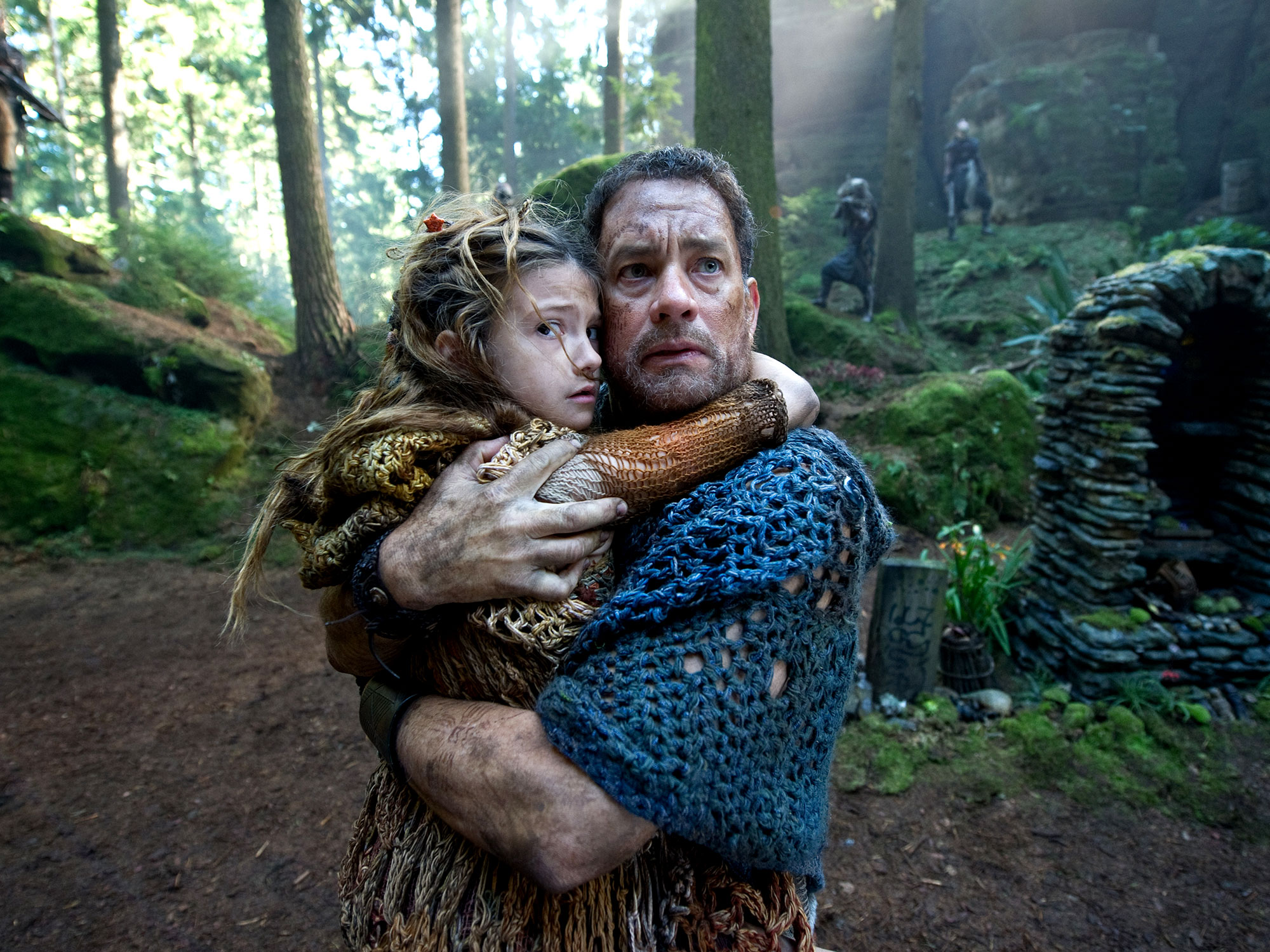If ambition and scale were the sole criteria for judging movies, Cloud Atlas would be a towering achievement. But this sometimes daring movie, based on David Mitchell’s sprawling novel about the interconnectedness of humanity and lives that reverberate across centuries, is at best a curiosity with isolated moments of grandeur and at worst, emotionally frigid–mainly an exercise in how to do very little with a lot.
It’s both smart and silly, a huge canvas risk of a movie that juggles six stories across five centuries and features top flight actors in multiple roles, replete with prosthetics, gender and ethnic changes and less substance in 172 minutes that should have been. What struck me the most about the picture, which has been made with impressive directorial vision and ingenuity by Andy and Lana Wachowski and Tom Tykwer, is how masterful technique—and it truly is—simply cannot substitute for substance.
Cloud Atlas is nearly impossible to describe, but the interlocking stories go something like this: in 1849, Tom Hanks is a nefarious doctor poisoning an American slave sympathizer, Jim Sturgess, aboard a ship in the South Pacific, captained by Jim Broadbent; Broadbent is also a composer in World War II-era Scotland, who takes in a lovesick, fledgling young composer played by Ben Whishaw, pining through letters for his betrothed, James D’Arcy, while dallying with the composers wife, played by Halle Berry in Caucasian drag; Berry is reporter circa 1973 San Francisco on to a big story about a villainous industrialist, Hugh Grant, about to unleash a Three Mile Island-esque meltdown while she intersects with both the septuagenarian James D’Arcy character, and Tom Hanks as a sympathetic scientist.
In the film’s most outlandish sequence, set in the post-apocalypse of 2300, Hanks and Berry meet again “after the fall” as he is a futuristic tribesman aiding her (a higher species) to unlock the history of her people’s legendary leader; that leader, played by Korean actress Doona Bae in the film’s most potent segment, set in the 2144 city of Neo Seoul, where Somni-451, a clone and one of a legion of waitresses who exists in the gallows below the gleaming city above, saved by the love of a freedom fighter and revolutionary (played by Jim Sturgess in evocative Asian make-up), becomes an anarchist and symbol of free thought in a totalitarian regime (not original, but beautifully executed).
This doesn’t even scratch the surface, however, and the film includes yet another tale featuring a 2012 Broadbent incarcerated in a retirement home at the mercy of a cruel Nurse Rached character played by Hugo Weaving, who also turns up as a green leprechaun in the 2300 sequence and a nefarious hit man in 1974. And I haven’t even mentioned Hugh Grant as a bloodthirsty cannibal in 2300, a world where everyone speaks in a fragmented English patois nearly impossible to decipher. Still with me?
Co-directed by the Wachowskis (1849, 2144, 2300) and Run Lola Run’s Tom Tykwer (1936, 1973, 2012), who directed the marvelous Whishaw in the underrated Perfume, Cloud Atlas moves seamlessly between its stories and styles, managing a truly stirring love them (the film was co-scored by Tykwer) used too briefly in the film’s final third.
This is a mega-movie, which is why Mitchell’s book was deemed “unfilmable” and why Cloud Atlas is dizzying in its narrative threading, more often than not inspiring not awe for perverse curiosity about who is under the make-up, which almost always looks unbelievably artificial, than for how the stories themselves fit together. Perhaps that’s the point. Cloud Atlas is a gorgeous aesthetic trip, certainly, but in service of what? In the end, as a grizzled old Hanks sits by the fire concluding his yarn, we realize that none of these individual stories has genuine emotional resonance (though the Whishaw/D’Arcy and Sturgess/Bae segments come closest).
It’s hard not to award points here because Cloud Atlas is reaching for greatness and doing something defiantly different and new, and it’s about something meaningful—how we are all a part of a cosmic, natural order, together—and the karmic implications of how we treat our fellow man will be visited on future generations. Heady stuff, yet not all that complex, and the film crusades on that theme for nearly three hours.
Ultimately, Cloud Atlas is about ideas not people, and for a movie about human interconnectedness that proves a fatal misstep.
2 1/2 stars.



